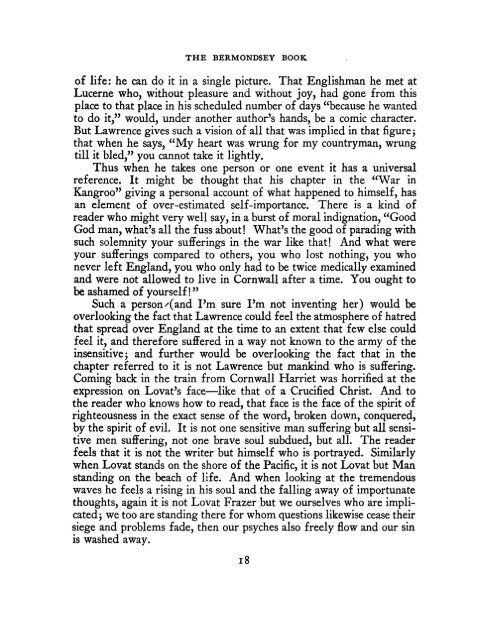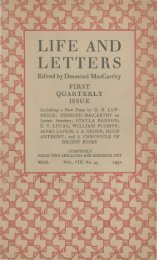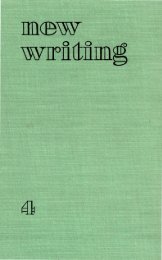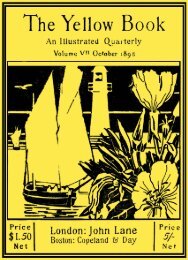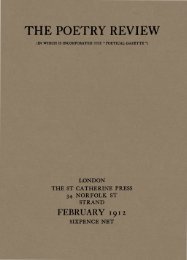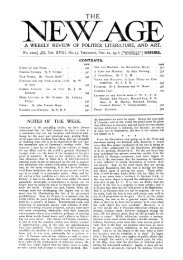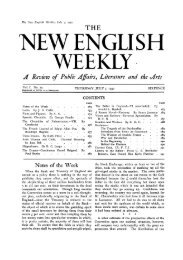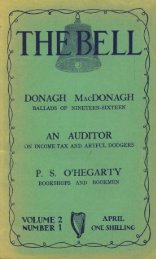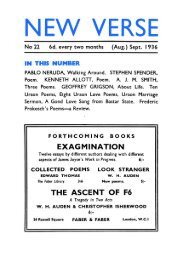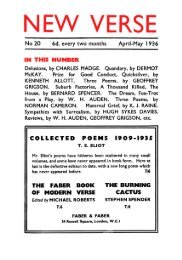Vol. VI No. 1 - Modernist Magazines Project
Vol. VI No. 1 - Modernist Magazines Project
Vol. VI No. 1 - Modernist Magazines Project
You also want an ePaper? Increase the reach of your titles
YUMPU automatically turns print PDFs into web optimized ePapers that Google loves.
THE BERMONDSEY BOOK<br />
of life: he can do it in a single picture. That Englishman he met at<br />
Lucerne who, without pleasure and without joy, had gone from this<br />
place to that place in his scheduled number of days "because he wanted<br />
to do it," would, under another author's hands, be a comic character.<br />
But Lawrence gives such a vision of all that was implied in that figure 5<br />
that when he says, "My heart was wrung for my countryman, wrung<br />
till it bled," you cannot take it lightly.<br />
Thus when he takes one person or one event it has a universal<br />
reference. It might be thought that his chapter in the "War in<br />
Kangroo" giving a personal account of what happened to himself, has<br />
an element of over-estimated self-importance. There is a kind of<br />
reader who might very well say, in a burst of moral indignation, "Good<br />
God man, what's all the fuss about! What's the good of parading with<br />
such solemnity your sufferings in the war like that! And what were<br />
your sufferings compared to others, you who lost nothing, you who<br />
never left England, you who only had to be twice medically examined<br />
and were not allowed to live in Cornwall after a time. You ought to<br />
be ashamed of yourself!"<br />
Such a person/(and I'm sure I'm not inventing her) would be<br />
overlooking the fact that Lawrence could feel the atmosphere of hatred<br />
that spread over England at the time to an extent that few else could<br />
feel it, and therefore suffered in a way not known to the army of the<br />
insensitive ; and further would be overlooking the fact that in the<br />
chapter referred to it is not Lawrence but mankind who is suffering.<br />
Coming back in the train from Cornwall Harriet was horrified at the<br />
expression on Lovat's face—like that of a Crucified Christ. And to<br />
the reader who knows how to read, that face is the face of the spirit of<br />
righteousness in the exact sense of the word, broken down, conquered,<br />
by the spirit of evil. It is not one sensitive man suffering but all sensitive<br />
men suffering, not one brave soul subdued, but all. The reader<br />
feels that it is not the writer but himself who is portrayed. Similarly<br />
when Lovat stands on the shore of the Pacific, it is not Lovat but Man<br />
standing on the beach of life. And when looking at the tremendous<br />
waves he feels a rising in his soul and the falling away of importunate<br />
thoughts, again it is not Lovat Frazer .but we ourselves who are implicated<br />
y we too are standing there for whom questions likewise cease their<br />
siege and problems fade, then our psyches also freely flow and our sin<br />
is washed away.<br />
18


